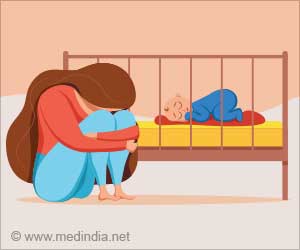Young teenagers believe pregnancy would help them form connections with others, such as bringing them closer to their boyfriend or creating a family of their own.
Young teenagers believe pregnancy would help them form connections with others, such as bringing them closer to their boyfriend or creating a family of their own. Even teens who acknowledge that they lack preparedness believe there are advantages in attaining motherhood early in life. Researchers have published observations on teen pregnancies in the current issue of Pediatrics.
"We need to help teen-agers identify ways to connect with others in life besides motherhood," says lead author Cynthia Rosengard, PhD, MPH, a researcher in internal medicine at Rhode Island Hospital and an assistant professor of medicine at Brown Medical School. "If those connections are lacking in a teen-ager's life, that's something we all need to look at – whether we're parents, teachers or physicians."The study was conducted with 247 pregnant adolescents, ages 12 to 19, who were seeking prenatal care at a primary care clinic. They were given a survey that asked for demographic information and included open-ended questions about the advantages and disadvantages of being pregnant as a teen-ager compared to waiting until they were older.
While the teens' answers varied, there were common themes. Among the list of advantages, they believed a baby would help them form connections with others, such as bringing them closer to their boyfriend or creating a family. One 13-year-old noted as an advantage, "being able to play along with your child not only being his/her parent but being a friend."
Some said if they had a baby early in life, that would give them more time later to accomplish what they wanted. For example, one adolescent said her child would be older when she wanted to become a lawyer. Others expressed concerns about fertility later in life. And some said they would receive more support as a young parent than if they were older.
Some teens also said having a baby would require them to mature and take on more responsibility; one young woman said that motherhood would keep her from drinking and doing drugs. A 15-year-old wrote "the good thinks (sic) are that I have someone to live for."
Among disadvantages, teens expressed that they would have more responsibility and would miss out on typical adolescent experiences. Some said they would have to put their lives on hold and revise their life goals. They also expressed concern that they could have difficulty juggling school and motherhood and might have to drop out of school. A 14-year-old responded: "1. No job to support me and my baby 2. I’m (sic) not out of school."
Advertisement
Disadvantages mentioned by a 17-year-old were: "financial problems. Not waiting until I was married because I'm not sure if the father is always gonna be there."
Advertisement
Researchers also found a difference among Hispanics compared to other ethnic groups; Hispanic teens were less likely to say they were unprepared to raise a child. Overall, those surveyed cited more disadvantages than advantages to teen pregnancy. However, Hispanic teens cited positive aspects of pregnancy in terms of how it enhanced connections with others, including the perception that a baby would bring them closer to their boyfriend.
In the survey, disadvantages outnumbered the advantages, possibly because society sends many negative messages about teen-age pregnancy, Rosengard says. However, because the teens were already aware of some of the drawbacks, intervention efforts should reinforce these challenges.
"We can say that if you happen to get pregnant or you choose to get pregnant, you're most likely going to have to put aspects of your life on hold. Chances are that you are going to miss out on being a teenager because there are more responsibilities. Perhaps if these disadvantages were more salient to these adolescents, they might have been able to do more to avoid a pregnancy," Rosengard says.
There are known health consequences of teen-age pregnancy, as well. Adolescents often delay seeking prenatal care, have poor prenatal health behaviors, and give birth to low birth-weight infants. Even healthy infants born to teen-age mothers are at increased risk of neonatal death.
While pregnancy rates have declined in recent years, in 2000, more than 800,000 girls under the age of 20 became pregnant in the United States – with about half of those giving birth. In recent years, there has been a strong emphasis on programs designed to prevent teen-age pregnancies. However, little work has focused on what teen-agers believe about pregnancy, the authors write.
The collective responses in this study tell researchers that there is no uniform way to prevent teen pregnancy. "You really need to know who you're talking to and where they're coming from, and that should help you to tailor the way you intervene," Rosengard says.
Source: Eurekalert











